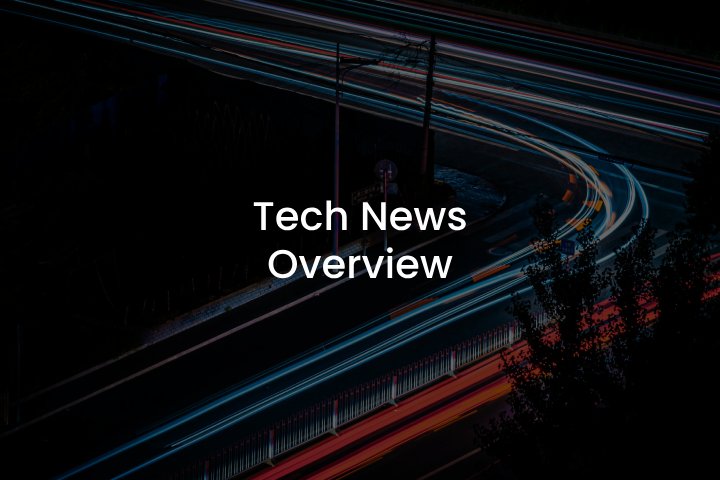
Tech News Roundup – July 2024
Hot weather and even hotter tech stories are already here. July brings us many exciting developments and innovations. So, let’s review them in detail.
OpenAI Makes ChatGPT’s Ultrarealistic Voice Accessible to Select Users
OpenAI began releasing the hyperrealistic speech feature of ChatGPT to a small group of paying consumers in the fall of 2024. Originally shown in May, GPT-4o stunned viewers but drew criticism for sounding Scarlett Johansson’s voice without permission. OpenAI delayed the release to increase safety by deleting her voice from the demo and then denying using it.
Premium customers may now utilize the voice feature; screen-sharing and video are not included. Unlike the existing Advanced Voice Mode, which detects emotions and uses a multimodal model for quicker, more natural responses, Four preset voices are included in the release to eliminate deepfake problems and block copyrighted audio production, thus avoiding legal issues.
Meta Pays $1.4 Billion for a Lawsuit on Facial Recognition Laws
Meta has agreed to pay Texas $1.4 billion to resolve a lawsuit claiming facial recognition software used without user permission violated state privacy rules.
The central point of the case centered on Facebook’s “Tag Suggestions” function, which utilized facial recognition technology to automatically detect and identify individuals in uploaded images. Though there were assertions the function was beneficial, it raised serious privacy issues and resulted in several court disputes. Since then, Meta has erased billions of biometric data and stopped running its facial recognition technologies.
Synchron’s Brain Implant Powers Apple Vision Pro
A neurotech startup called Synchron has effectively coordinated Apple’s Vision Pro headset with its brain-computer interface. Patients with restricted mobility can use this innovative technology to control the helmet just with their thoughts.
Employing a minimally invasive technique, Synchron’s BCI is implanted in the brain and detects and sends brain signals to outside devices. Working with Apple, the startup hopes to provide those with paralysis fresh degrees of autonomy.
Although still in the early phases, this advancement in BCI technology and its ability to transform human interaction with technology represents a major forward direction.

OpenAI Releases SearchGPT to Compete in the Search Engine Market
Launched by OpenAI, SearchGPT is a modern AI search tool meant to challenge Google, Bing, and others. SearchGPT allows users to delve deeper, integrates location-specific outcomes, and delivers “timely responses” sourced from the web. Currently accessible to a select group of users, it shares the interface of OpenAI’s ChatGPT and intends to be included in ChatGPT going forward.
SearchGPT is intended to offer reliable, ethically sourced knowledge, mostly referencing and connecting to publishers. It also lets website owners control how search results present their material. This release comes with complaints of AI-powered search engines for problems including plagiarism and errors. OpenAI ought to present SearchGPT as a more reliable and ethical option in the AI search industry.
Apple Intelligence: Initial Features Arrive with iOS 18.1 Beta
Apple has begun integrating some Apple Intelligence features into the iOS 18.1 development beta. Users can currently enjoy some basic capabilities even if the whole range of AI-powered tools is not yet accessible.
Essential points:
- Restricted availability: At the moment, only iPads and Macs with M1 processors and US English and country settings, as well as the iPhone 15 Pro and iPhone 15 Pro Max, can be used.
- Initial capabilities: Siri enhancements, writing tools (including summarization, revising, and proofreading), email summarization, and an improved Focus Mode.
- Limitations: Many of the features that were previously promised, including ChatGPT integration and Image Playground, are still unavailable as a result of ongoing development and issue corrections.
This is an early view of Apple’s AI aspirations overall; future updates should include more all-encompassing tools.

Qualcomm’s New Chip Expands 5G Access to Mass Market
Qualcomm has introduced the Snapdragon 4s Gen 2 processor, which is designed to be compatible with low-cost devices. The objective of this strategy is to enhance the availability of 5G technology in regions that are sensitive to pricing, such as India and Latin America.
The chip is intended to meet the growing demand for affordable 5G devices, particularly in India, where feature phone users have been hesitant to upgrade due to a lack of cost-effective 5G options.
While the chip has 5G capabilities, it is only applicable to stand-alone 5G networks, which are currently less widespread than non-stand-alone networks.
Despite hurdles such as the higher cost of 5G devices and plans, Qualcomm believes this chip will boost competition and lower prices in the entry-level smartphone category.
U.S. Department of Commerce Endorses Open AI Models with Cautions
The US Department of Commerce has released a paper endorsing “open-weight” AI models, including Llama 3.1 from Meta. The paper emphasizes the role of open models in promoting innovation and competitiveness.
The department does, however, also recognize possible hazards and advises continuous observation as well as possible limitations are needed. The study offers a structure for assessing these hazards and creating suitable defenses. This attitude is consistent with the Biden administration’s general AI strategy of balancing innovation and safety.

Rapido Becomes a Unicorn
Rapido, a bike-taxi startup in India, has been valued at $1 billion, making it the most recent unicorn in the country. The company raised $120 million in Series E investment, with WestBridge funds as the primary contributor.
Rapido’s emphasis on two-wheelers has helped it to stand out from conventional taxi-hailing companies in India’s crowded cities. Its development has also been greatly aided by its relationship with the massive meal delivery company Swiggy.
Rapido’s expansion goals will probably be fueled by this fresh money, which will also help to clarify its place in the Indian mobility scene.
NIST Releases Dioptra Tool to Test AI Model Risks
Designed to evaluate the vulnerability of artificial intelligence models to hostile attacks, NIST has produced an improved version of their open-source tool, Dioptra. By replicating real-world hazards, the tool enables businesses and academics to assess the resilience of their AI systems.
Important highlights:
- Dioptra’s goal: To track, especially those aiming at training data, how AI model performance suffers under attack.
- Open-source character: Encourages cooperation and accessibility in artificial intelligence safety research.
- Limitations: Not those obtained via APIs; only works with downloaded models right now.
- Government assistance: Complementing President Biden’s executive order on AI safety with NIST’s more general initiatives in AI risk management.
Although it is not a whole fix, Dioptra is a useful tool for knowledge of AI weaknesses and guiding the creation of safer AI systems.
Max Space Revolutionizes Expandable Habitats
Max Space, a newly formed company, intends to transform space settlement by introducing its distinctive expandable residences. Inspired by a mathematical idea from the 17th century, the business has created a lighter, more flexible, stronger design than current technology.
Important benefits of Max Space’s approach consist in:
- Improved structural integrity: For great strength and predictability, use a “tendon” system modeled on a mathematical idea from the 17th century.
- Compact design: The habitats can be squeezed into a small, flat package for effective launch.
- Versatility: Adaptable for several forms and layouts for varied spatial settings.
Launching its prototype in 2026, Max Space hopes to significantly forward more reasonably priced and spacious living and working conditions in space. Max Space has the potential to transform the future of space exploration by questioning existing methods and using a centuries-old mathematical principle.
Thank you for reading our tech news rubric. Keep yourself updated with the latest developments in the technology landscape by subscribing to our newsletter.


